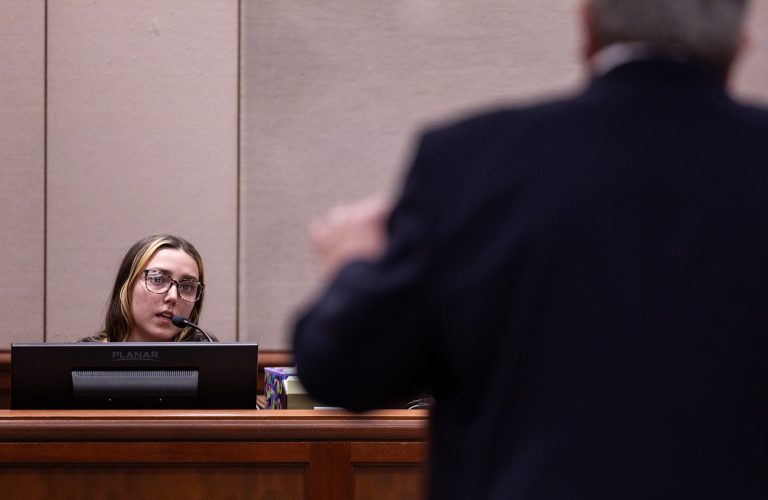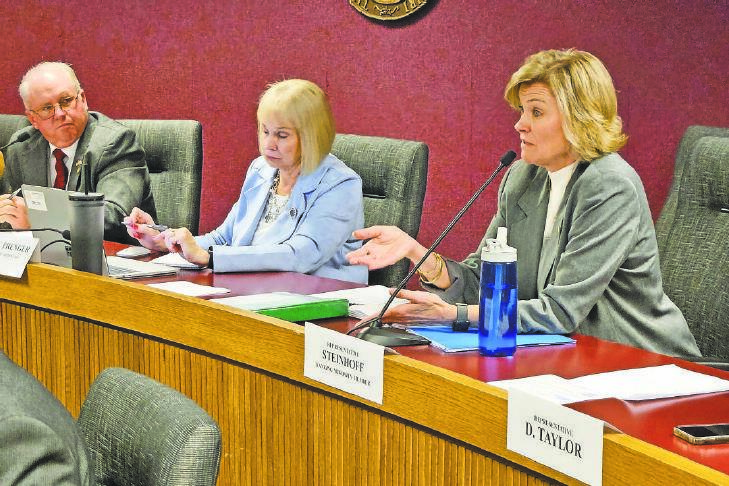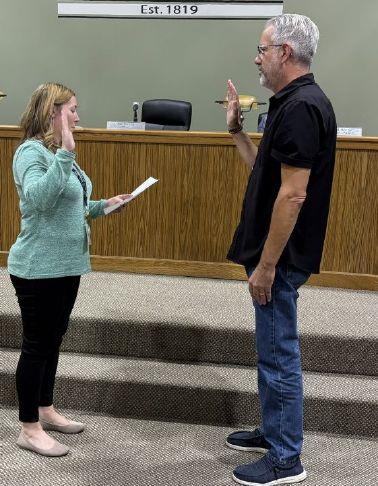Judge Sentences Zenk to 7 Years

ST. CHARLES – After Circuit Judge Michael Fagras revoked Hailey Zenk’s probation, sending her to prison for seven years, the 19-year-old was overwhelmed with panic.
“What do you mean! What do you mean! What do you mean,” she shrieked through tears while looking at her husband and other family members seated behind her in the St. Charles County courtroom.
She quickly learned what the judge at least meant as deputies led her into an adjacent hallway where she was handcuffed and led to prison, sobbing the entire time and protesting “I didn’t do anything.”
But after a 3.5-hour probation hearing, the same judge who opted for “justice with leniency” and suspended her 10-year sentence after she pled guilty to charges stemming from a 2023 wreck that killed three, disagreed.
“I really hoped it wouldn’t come to this and I wouldn’t have to see you again,” Judge Fagras said before imposing the original seven-year sentence given for her guilty plea to three counts of involuntary manslaughter and driving while intoxicated-serious injury.
Fagras also disputed testimony from her husband, Gabriel Carrera, that the alcohol detected during the first of two tampering incidents with a monitoring bracelet was related to cooking wine.
“I don’t believe wine in the pasta had any affect,” he said. “I do believe alcohol was involved — I wish to hell it wasn’t. How I wish this never happened, but it has.”
After Zenk entered an Alford Plea to the four previously mentioned felony charges, along with a fifth, driving while intoxicated resulting in the death of two or more, Fagras sentenced her to 10 years, but suspended all of it but 120 days.
She was however placed on probation, which required her to wear an alcohol monitoring bracelet 24 hours a day for six months.
Device Installed
According to testimony at the hearing Monday, probation officials installed the bracelet Oct. 22, 2024, after Zenk served her 120-days in jail.
One month later, the device reported a tampering incident Nov. 22 from 10:30 p.m.-5:30 a.m. the following day. During that time, it detected alcohol.
Zenk testified she was home during that time, watching movies and baking cookies with her husband before taking a shower and putting on foot lotion that contained citrus alcohol.
During Zenk’s cross-examination, Special Prosecutor Dulany Harms reminded her as part of her signed agreement relating to the monitoring bracelet she agreed not to use lotions of any kind.
“Yes, that was my mistake thinking it was alcohol free,” Zenk responded.
A Second Incident
After that initial tampering incident, the device recorded a second one Nov. 24, from 5:30 a.m. until overnight the next day. However, it did not detect any alcohol in that 23-hour period.
Zenk said she attended church that day with her husband, an assertion supported by video and a still image evidence obtained from the church. She then went to lunch at a Troy restaurant with a “father-figure,” Johnathan Jansky. After lunch, she went with her husband to a house to clean out gutters before going shopping for a birthday present for his brother. She said then returned home for the rest of the day.
Jansky testified Zenk didn’t consume any alcohol at lunch. Again during Zenk’s cross-examination, Harms highlighted a section of the agreement prohibiting her from associating with known felons. Jansky previously testified he had been convicted of several felonies in California and Missouri.
Zenk’s defense attorney, Joel Schwartz, questioned throughout the hearing the functionality of the bracelet, including when it was last calibrated, when the batteries were changed, and how well it was installed.
During Carrera’s testimony, Schwartz played a video of Zenk moving the bracelet up and down her leg, demonstrating how loose it had become.
However, Carrera testified he made that video Dec. 9 after they became aware of Zenk’s arrest warrant for tampering with the device, two weeks after the second violation.
Additionally, Eastern Missouri Alternate Sentence Services (EMASS) officials previously testified during weekly meetings with Zenk Nov. 19 and Nov. 26, the bracelet appeared properly installed.
No Coincidence
Harms stated in his closing argument that the tampering incidents occurred during Thanksgiving weekend and a few days before Zenk’s wedding.
“I don’t think it’s a coincidence. I think that it’s just something that she did. I don’t know what the reasons were,” he said. “Unfortunately, we don’t have video until two weeks later when her strap was loose. But the thing that’s most important … on two days before that first event happened, that bracelet was tight on her ankle. Then two days after, on the 26th … that bracelet was straight on her ankle. There’s no evidence whatsoever that it was loose. And the only evidence that comes that that bracelet was loose, and they had videos, is when they find out there’s a problem, and then, oh, they do everything they can to try to find an excuse for it.”
Shaun Stewart, a data analyst with the monitoring device’s manufacturer, reviewed information from the tampering incident and provided key testimony Fagras cited before his ruling.
Stewart stated something “reflective” and lighter than Zenk’s skin tone was detected during the tampering incidents, adding even if the device was loose, it would be “highly unlikely” for a piece of clothing or bed sheets to block it.
He also stated while the device detected alcohol, it didn’t “come close” to reaching the criteria to determine it had been consumed. However, he added any deliberate tampering with the device would impair its ability to determine the difference between detection and consumption.
‘Enough is Enough’
During closing arguments, Harms stated the time had come for Zenk to face some accountability for her actions.
“This girl has been given ample opportunities to comply with the requirements for the terrible things she did, the deaths of three young people, their life snuffed out,” he said. “In some way, she just keeps managing to have violations … and I’m sorry, enough is enough of this.”
Displaying obvious frustration and disappointment, Fagras said he had never shown the level of mercy to any anyone guilty of a similar crime before Zenk.
“I took into consideration things I don’t normally take into consideration,” he said. “What’s really troubling to me is I had to bring these families back into the courtroom twice and it just reopens the wound over and over, preventing them from healing.”
Given an opportunity to address the court once more, a tearful Zenk offered apologies but no explanation for what happened.
“I don’t know what’s going on. I don’t know. All I know is I wouldn’t jeopardize my freedom and the blessing of having another chance,” she said. “I’ve been trying to do everything right. I tried to take a lie-detector test and they dismissed it. I tried to get a hair follicle test. I tried to do everything to prove that I didn’t do anything wrong. I’m so sorry to open the wound in this again.”
The Reaction
After Fagras granted Zenk a second chance at the June 2024 sentencing, family members of the victims, William Flickinger, 18, Kaeden Tyler, 15 and Emily McNees, 17, expressed outrage.
Monday though, their sentiments changed significantly.
“I walked in here anticipating nothing to happen again, and he blew my mind,” Tyler’s mother, Sue Ann Tyler said. “He surprised me.”
Tyler’s step-father, Doug Meyer, echoed her sentiments.
“It was totally opposite this time,” he said. “The last time, I thought she was gonna get the book thrown at her and she didn’t get nothing then I thought she was going to get out this time and she got the book thrown at her. It’s totally opposite what I thought.”
Before the hearing, Lincoln County Prosecutor Mike Wood said there would be no plea bargain as he wanted to see the full 10-year sentence imposed.
“I was kind of surprised he (Judge Fagras) didn’t go with it (full 10 year sentence),” Wood said of the ruling. “But it seemed to me the families of the victims were happy with the seven- year sentence. My position is, if you get a break, and we all agree she got a break, that if you screw the break up, you should have gotten worse than what you would have got to begin with.”


